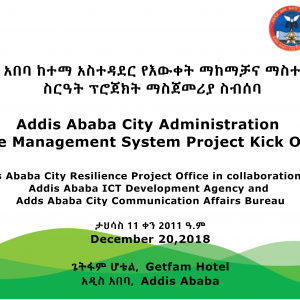The Addis Ababa resilience office announced starting new knowledge Management system in collaboration with Addis Ababa ICT development agency and Addis Ababa City Communication Affairs Office. The project will be finalized within the coming six months. Dr. About Bayu, the Addis Ababa administration, communication technology agency Director, said that after the project finalized the city will be the first user to the new knowledge management system. As for him, the system will organize the practice, research, history and other important documents of the city moderately to deliver for users easily. The project will be addressing a lot of problems significantly, which are the challenges of the fast growing Addis Ababa city.
Ethiopian Press Agency
Source- https://www.facebook.com/ethiopianpressagency/photos/a.504616456356374/1202465076571505/?type=3


